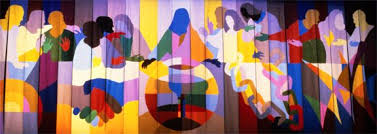
Luke 17:11-19
What do you say now? What do you say?
I wish I had a dollar for every time I had to prompt my child with this question. They were just given a birthday gift from a friend. Uncle Greg sent a Christmas card with money. Someone in church paid them a compliment. What do you say? Thank you of course. It seems like it should come automatically, but it doesn’t all the time. We want our kids to have good manners, to be polite, to be ready without prompting with the pleases and thank yous. Before my kids could play with their gifts, they had to write the thank you notes. Saying thank you is one of the fundamental acts of kindness, respect, revealing a grateful heart which is important to cultivate in this often too-hardened and thoughtless world.
People should thank other people, verbally or written, when they do kind things for them. It is said that on average, Americans say thank you 5 times a day, and don’t really mean it 3 of the times. It’s more of a rote comment instead of something spontaneous from the heart. It seems to me that five times is miniscule compared to all that we encounter in one day. We have food in our house and can take a warm shower. Someone holds the door for us. A server brings us our food or cup of coffee. Someone calls to see how we’re doing. We get a compliment, or an encouraging world. We walk out into the new morning, alive, ready to face the day that lies ahead. There’s a lot to say thank you for.
Looking back, the things I regret the most in my life are the times I forgot to express my gratitude, didn’t send a note, didn’t convey my thanks or appreciation for something I received, or a kindness extended. I didn’t display an awareness of someone’s gift. Saying thank you is a fundamental piece of a healthy lifestyle. It’s at the heart of a mature spirituality. It’s a habit that needs reclaiming in our post Covid world where basic human compassion has gone wanting in a lot of our social communications.
In our gospel lesson today, we learn a lot about the importance of thank you. As Jesus and the disciples are about to enter a village, ten lepers cry out, “Jesus, Master, have pity on us!” Among these lepers is in fact a Samaritan, a second-class citizen in the eyes of the Jews. Leprosy was such a dreaded skin disease, that lepers were banished and considered unclean. It took a disease like leprosy to bring Jews and Samaritans together. So, these lepers stood at a distance, and maybe were shouting “Unclean! Unclean! As the law demanded as Jesus approached, as they cried out to him.
Notice Jesus doesn’t say “You are healed.” Notice also, that he doesn’t say, “If you show yourself to the priest, you will be healed.” He doesn’t promise them anything, he just tells them to show themselves to the priests.
But the promise was inherent in what he said. In Leviticus 13-14, someone who had been healed or who had recovered from a skin disease was required to present him or herself to the priest in order to be pronounced clean.
So, to be full reinstated to community life, a cured leper had to be formally examined by the priest, announced officially cured and then and only then readmitted to society. Jesus was acting to not only heal but restore them to community. So, while they were on their way, they were healed. Can you imagine the joy that all of them felt at that moment? They, who were outcast, who had no hope, who had no future to look forward to, now had received their lives back! They could now go home to friends and family. They could kiss their wives again. They could play with their children. They were cleansed!
The Samaritan leper in our gospel story, however, pulls a big thank you. He alone, one out of 10 afflicted, refuses to follow through on Jesus’ simple command to “go and show yourselves to the priests.” When he realized he was cured, he turned back to Jesus. He postponed the official moment when he could be declared clean and socially acceptable. In his mind, there is more important business to take care of. So he goes to Jesus, the true source of community and wholeness. While praising God in a loud voice and throws himself on the ground at the feet of Jesus and thanks him.
Only one of the ten came back, all the while giving thanks and praise to God. Statistically, this account is probably true. When you serve others, only about 10% will thank you. Serving others can be a thankless task.
Now, the other side of this coin is true too. Though only 10% will thank us, do we make sure that we are the 10% that thanks others? When someone does something good for us, or nice to us, we need to thank them! Give them a card. Send them a plate of cookies. Just call them on the phone and tell them how much we appreciate them. Though only 10% of people thank you when you serve them, let us be in that 10% that loudly thanks others for what they have done for us, and be quick to thank God for blessings received. (For our salvation. For forgiveness of our sins. For healing in body and/or soul. For life in Christ and fellowship with one another. For the gifts of the Spirit. There you have it; five off the bat.)
Our genuine Thank yous become an act of worship. Meister Eckhart said, “If the only prayer you said was ‘thank you’, that would be enough.” If we begin there, with a simple “thank you” to God, the rest will follow. What do you want to say thank you for now? Can you tick off five things just off the top of your head? Let’s hear it! (pause)
As we continue our deliberate practice to fall into faith, seeking to be vital people making up a vital congregation, we discussed so far practicing mercy, practicing faith, praying, showing up and being a part of this community of faith, let us add to our arsenal the simple but potent thank you. May we give the example of thanks for all to see. Every day, let our lives be a thank you note we write to God, for all he has done for us. Let us be the one in 10 who is grateful to God and to others. When someone opens the door for you? Say thank you! When someone pays you a compliment, say thank you. As you sit down to your next meal, say thank you! When you open your eyes in the morning, say thank you for a new day. When you retire at night, say thank you for a day well lived. May the kind deeds we do for others be notes of gratitude we place at the feet of Jesus. What do we say? We say – THANK YOU! Amen.

 RSS Feed
RSS Feed